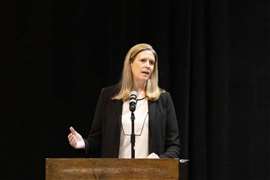New challenger: IRN talks to Milan Balac, of Dubai's Rental Solutions & Services
16 October 2009

What is it about power and temperature control rentals and Scotland? Not content to having the world leader in the market - Glasgow-based Aggreko - it is a Scottish businessman who is now behind one of the world's fastest growing power/TC rental companies, Rental Solutions & Services (RSS) in Dubai.
Robert Kidd, an Aberdeen-based entrepreneur and owner of multi-national oil and gas service company ITS Group, is the prime mover and majority shareholder of RSS, a company that was originally established in April 2007 as a division of ITS but since October of the same year has been run as a separate company.
Managing director of RSS is Milan Balac, an experienced mechanical engineer with a 25 year background with HVAC specialist York International and Johnson Controls. Raised in Birmingham, UK (his name comes courtesy of a Yugoslavian father), Mr Balac tells IRN that it was mutual friends that put him in contact with Mr Kidd and it was then a short step before he left York to take up the reigns at RSS.
The business plan was to exploit what the two men saw as an enormous opportunity to supply chillers for the Dubai and Middle East market, as Mr Balac explains; "Initially, RSS's objective was temperature control. We could see the whole GCC (Gulf Cooperation Council) area was changing its approach to cooling. Owners and developers, instead of installing cooling systems in their buildings, would do it from central district cooling plants. Then, it is the tenants or occupants who pay for the cooling."
The point is that these cooling plants are often unfinished by the time the building is ready to be occupied, hence the need to rent temporary cooling systems. "That was a phenomenon, and it still it. We stepped in at the right time", says Mr Balac.
Some of these contracts have been enormous. Mr Balac mentions one for 7500 t of cooling refrigerant over an eighteen month period that earned the company around US$0.5 million a month; "That whole contract was $9 million", he says.
At the beginning, a lot of the equipment - including generators to power the chillers - was re-rented from competitors, including Aggreko. Mr Balac realised that re-renting in this way was simply telling its competitors where its customers were, and as a result, the company committed itself to a significant investment to boost its own fleet - US$35 million has been spent in the last two years and another $6 or $7 million is planned this year.
The fleet now comprises around 100 MW of power, all Cummins units and the largest being 1250 kVA, as well as 130 chillers rated at 200 TR/700 kW (these are supplied by York, each costing around $100000). One of the benefits of Mr Kidd's involvement, says Mr Balac, is the credibility and contacts that he brings, particularly with RSS's main source of funds, the Bank of Scotland, which is providing an "eight digit" finance facility.
Mr Balac says the early reliance on these district cooling plant contracts, although still a decent business, has given way to a wider strategy to target power rental contracts as well as temperature control. If cooling represented 70% of its business in 2008, the mix will be reversed this year, with power contracts constituting the majority of its business.
"The power business will be in support of our chiller fleet, supporting some competitors chillers, and the rest is from the open rentals market", he explains.
The logic of the move - even before the slowdown in Dubai that will have an obvious impact on the cooling plant business - was that RSS had a 30% share of the chiller market in its territories, but a tiny 0.4% share of the power rental sector; "We saw that it had a massive opportunity to grow."
That realisation triggered the start of major effort to expand outside of Dubai. During its first two years, RSS had focused entirely on serving Dubai, but the last year has seen the company establish joint ventures and agency agreements with partners in Saudi Arabia, Bahrain, Oman and Qatar. "We prefer full investment, local partners on a dollar to dollar basis", says Mr Balac, "Partners can be extremely important in this region."
Partners include Dyarco in Qatar, the Shoaibi Group in Saudi Arabia and, most recently, Mubadarah Investment in Oman. "By the end of this year we think that we will have full legal entities in every country in the GCC [the Gulf Cooperation Council states, comprising Bahrain, Kuwait, Oman, Qatar, Saudi Arabia and the United Arab Emirates]", says Mr Balac.
But RSS does not seem content with the Middle East. Mr Balac tells IRN that the plan is to expand its operations into every developing market in the world. He says he is not interested in moving into highly competitive markets like western Europe and North America, but other territories are fair game.
"We see a huge amount of opportunity in every developing country around the globe. Next year, we intend to enter the Indian sub-continent as the Middle East slows up. We also think the Asia Pacific Rim, Latin America and sub-Saharan Africa will give us a lot of opportunity. The barriers to growth are people and equipment - people more than product."
This expansion plan will include areas that some might see as risky, including Iraq; "It's a massive opportunity, but people are reluctant to go there. We can service it from the Middle East", he says, "The first people in will bear the fruits of their conviction and courage."
Any territory with mineral wealth is seen as offering rich pickings, and Mr Balac highlights the ‘stans in eastern Europe, with Kazakhstan being the prime target; "That will be the end of 2010 probably", he says.
RSS will be helped in this expansion by its close links to Robert Kidd's ITS business, which has facilities and workshops in almost 20 locations around the world, including North Africa, the Middle East, China, Singapore, Mexico and eastern Europe; "They can help us with facilities and market know-how", says Mr Balac. The two companies already share a facility in Dubai, although RSS is in the process of developing a new 150000 ft2 facility between Dubai and Abu Dhabi.
"We want to be a global player", says Mr Balac, "I can't say when, but we will be more than a regional company. Our view is to grow as quickly and as we possibly can in as many territories as we can."
The final part of the grand strategy is an expansion of its product range. Power and temperature control will form the core of the fleet, but Mr Balac says he is thinking of adding other products such as load banks (a few units have already arrived), transformers and other types of cooling equipment, such as air handling units, heat pumps, heat wheels (air-to-air heat exchangers) and DX (direct expansion) units.
Nor does he rule out construction equipment rentals where opportunities arise, but says that that will not be a priority.
It is easy to get carried away with all this talk of growth. Today, RSS remains a regional player: Mr Balac does not divulge revenue figures for 2008, except to say that EBITDA (earnings before interest, tax, depreciation and amortisation) was around $10 million and is expected to grow by 60% this year. A three year plan taking the company up to 2011 aims to see revenues reaching "$100 million plus".
Even then it will be dwarfed by Aggreko, which last year posted revenues of almost €1 billion and which, remember, has a respectable growth trajectory of its own. And, of course, Netherlands-based Energyst is making its own global moves - most recently in Peru - and is already an €83 million turnover business.
However, it is clear that RSS and Mr Balac have Aggreko in their sights. He says he has enormous respect for his "main competitor" but claims that it's a great company that has never had a huge competitive challenge. "We do want to give them a run for their money", he says.






